The Miseries of a life at Sea
8 January 2019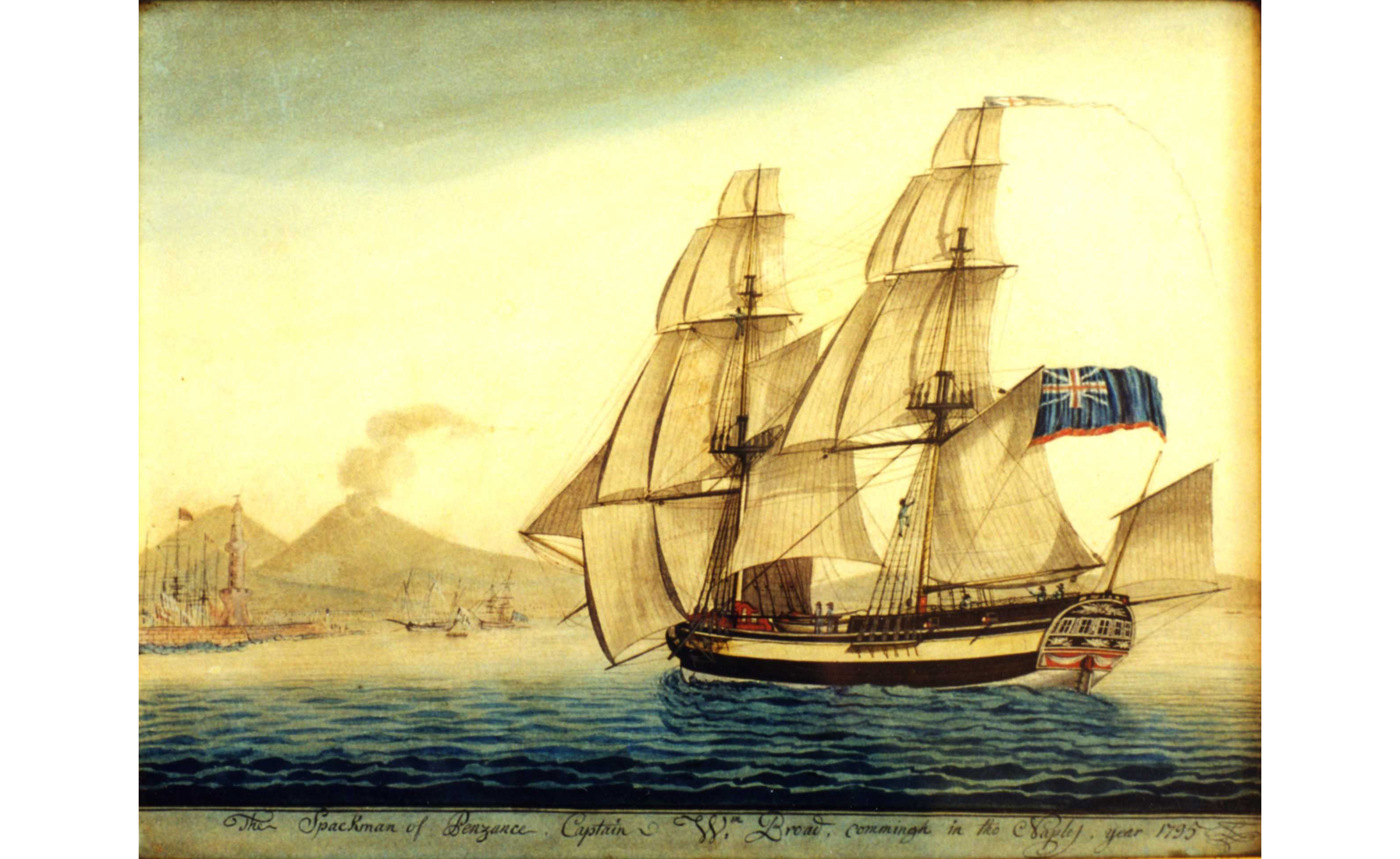
New: Broad and Sons, Ship Agents of Falmouth
12 February 2019During the C19 there were two large Ship Agents operating in Falmouth: Fox’s and Broad’s. They acted as agents for the many ships calling into Falmouth, especially those calling for orders, and acted as Consuls for many different countries. In this article, Bartlett Volunteer Linda Batchelor looks into origins of Broad & Sons and traces the later family.
At the beginning of the 19th century William Broad set up a home and a business in Falmouth, Cornwall. Initially trading as William Broad & Co. the company soon became well known as shipping agents and merchants in the seaborne trade importing a variety of goods including wines and spirits. At the same time the family was quickly established in the town. Indeed over the next two centuries the Broad family grew and several generations became involved in various aspects of the economic and social life of Falmouth. As Susan Gay stated in her book Old Falmouth : ‘The name of the family has been long interwoven with the events of Falmouth’.[*]
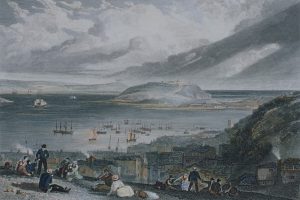
Falmouth Harbour
Joseph Mallord Turner R.A. 1775-1851, Engraver W.B. Cooke, Falmouth Art Gallery
The town of Falmouth had been growing steadily since its first inception in 1613 as part of Sir John Killigrew’s plan for the establishment of ‘a town of Smithicke’ and harbour at the mouth of the River Fal.[*]
By 1650 the Custom House had moved from nearby Penryn to Falmouth emphasising the increasing importance of the harbour and port and in 1661 the Charter of Incorporation was granted by Charles II for the ‘village’ of Smythwicke and its associated port to become the ‘town of Falmouth’.[*]
With its own mayor and corporation, a weekly market and expanding port and trading facilities the new town flourished. Falmouth became an important Packet station in 1688, initially serving Lisbon and other Iberian ports and by 1705 there was also with a regular service to the West Indies and the Americas.[*]
The town and the port continued to develop throughout the 1700s with the establishment of banks, schools and a public dispensary, a new Custom House and the growth of the Packet service and the seaborne trade. It was described by Daniel Defoe as ‘by much the richest and best trading town in this country’[*] with the emergence of a strong and influential merchant group. In 1801 the population had risen to just under five thousand and Falmouth was one of the foremost ports in England. It was here that William Broad chose to set up a home and a business as a shipping agent and merchant on his retirement from the sea in 1808.
William Broad, the founder of Broad & Co, was born in 1772 and raised in the vicinity of Penzance where in the latter part of the 18th century there were a number of Broads who were established in trade and as ship owners. In 1794 he married Jane Richards at Madron near Penzance and they had several sons and daughters, some of the children born in Penzance and others in Truro and Falmouth.
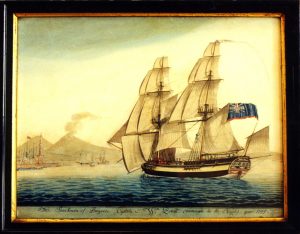
The “The Spackman of Penzance Captain W.m Broad commingh in the Naples, year 1795”
Copy in the Tony Pawlyn collection, by permission of the late R. L. Broad, Esq.
William was educated at Truro Grammar School and his early career began at sea attaining command of modest merchant vessels working out of Penzance. The first Penzance Shipping Register (1786 -1823) [*] records William Broad as master of several small vessels, the Salcombe, a 32 ton sloop in 1793 and the Joanna, a 59 ton sloop in 1795, both employed in the general coastal trade. From October 1795 William was the master of the Spackman, a much larger Brigantine of 101 tons. Originally built in 1764 as one of the tin ships conveying tin ingots from Cornwall to London, by 1794 she had been released from that trade and was regularly employed in carrying salt cured pilchards to Italy and returning with olive oil and dried fruit from the middle east.
William became a member of the Levant Company [*] and then master of vessels sailing from Truro and Falmouth. These mercantile vessels were mainly involved in trade with the Mediterranean and the Middle East and also with the West Indies in what was a period of war and unrest. In such hostile times English vessels were open to attack from French and Spanish privateers and for security these valuable mercantile fleets often sailed under Royal Navy convoy.
William’s last commands as master of such ships were the Pelican and the Phoenix of Truro. In 1803 the Pelican on homeward passage from Smyrna was captured by a French privateer and taken to Sfax near Tunis. What happened to Captain Broad and his crew is uncertain but in October 1804 the Pelican was sent from Sfax to Constantinople and was recaptured by the British and taken to Malta.[*] By 1806 Captain Broad was in command of the Phoenix sailing in Royal Navy convoy in the Mediterranean with Commander Robert Pettet of HMS Termagant. At the conclusion of the voyage the commander sent the following letter to the Company of Merchants at Lloyd’s.
‘Gentlemen,
Having received the greatest assistance from Capt. William Broad, of the Phoenix, Symrna ship, during my passage from that place to Malta, and from thence to Gibralter; I consider it a duty I owe to that gentleman to state to you the very great exertions he used during the whole of that passage, not only by answering and repeating promptly my signals, but by taking such vessels of the convoy in tow that at any time happened to be sternmost.
I have therefore taken this method of testifying my thanks to Capt Broad, being assured that it must meet your appreciation.’ [*]
In 1808 Commander John Bowen of HMS Camilla also wrote to the Company of Merchants at Lloyd’s to praise the good conduct and help rendered to the Leeward Island Convoy by William Broad, Master of the ship Phoenix of Truro.[*]

Royal Cornwall Gazette – 16/12/1809
At this point William quitted the sea and by 1809 had established William Broad & Co, Ships Agent and merchants in Falmouth. The precise date of establishment is not certain but the company was acting as general agents and importers by late 1809 as evidenced by an early advertisement in the Royal Cornwall Gazette[*] of December 16th 1809 for the sale of casks of Zante currants ‘of the finest quality and in prime order’.
With William as head of the company the firm prospered and expanded. As well as acting as shipping agents the company was also appointed to other marine agencies, provided services such as marine surveying and valuations and operated as importers and general dealers in many commodities, especially wines and spirits.
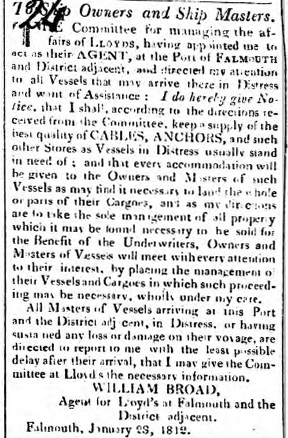
Royal Cornwall Gazette -1/2/1812
As the family grew and William’s sons entered the business, subsequently the firm was titled William Broad & Son and ultimately as William Broad & Sons.
In its early days the firm occupied premises in Quay Street and then in Arwenack Street and Church Street. Later the main business premises for Broad & Sons was in Arwenack Street in a building constructed for the Broads between 1860- 1870. The building is still there, now the Arwenack Club, formerly the Royal British Legion Club which was acquired by the Legion after the First World War. It is an imposing stone building fronting directly onto Arwenack Street and it looks out from the rear over the harbour.[*]
Initially the family would have lived and worked in some of the same premises but ultimately family members began to move further away from the work place. The second generation and beyond of Broads moved to the growing residential areas of Falmouth, such as Woodlane Terrace, away from the commercial heart of the town. In some cases Broad family members lived and worked abroad, for example in Mexico and Brazil, for periods of time.
In 1811 William Broad & Co were appointed as agents and marine surveyors for Lloyd’s at Falmouth.[*] Lloyd’s had begun to deal with maritime insurance in the 1730s. Over the periods of the American Revolution and the Napoleonic Wars the need for such insurance became vitally important and Lloyd’s became dominant in shipping insurance.
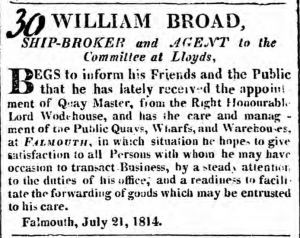
Royal Cornwall Gazette – 6/8/1814
By 1811 Lloyd’s had also decided to set up a network of agencies in various British ports. William Broad became one of the very first (or the first) of such agents to be appointed for Lloyd’s, probably as the result of his earlier commendations from the Commanders of HMS Termagant and HMS Camilla. The firm continued to act for Lloyd’s for generations and was ‘believed to be the oldest Lloyd’s agents in the world’ according to The Times Obituary for Mr CR Broad, head of Messr. William Broad and Sons, who died in 1928.[*]
As shipping agents, merchants and as Lloyd’s agent at Falmouth, Broad & Co had close involvement with undertaking valuations and damage assessment of ships, especially ships of the Packet Service. An example of William Broad’s role in this respect concerns the temporary packet Little Catherine.[*] At the end of 1812 William had carried out a survey of inspection of the ship together with Mr Henry Williams, a Post Office employee at Falmouth. A series of letters, held in the Post Office Archive, between Christopher Saverland (the Packet Agent at Falmouth) and Francis Freeling (the Secretary of the Post Office) illustrate William’s close subsequent involvement with damage assessment and valuation of the ship over the next two years.[*] Broad & Co also often acted as selling agents for the sale of ships, including some packet ships and the Broad family were also part owners of several packets. As an example by a sale advert dated 29th March 1814, William Broad appears to have been one of the five proprietors of the Speedy, a temporary packet on the Falmouth Station.
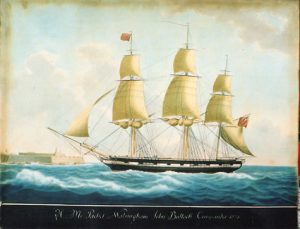
His Majesty’s Packet Walsingham,
Nicholas Cammillieri 1773?- 1860, Watercolour, NMMC
A number of packet ship portraits were painted in Malta during the first half of the C19th by the noted pierhead painter Nicolas Cammillieri (1773? -1860). Six of these portraits painted between 1817- 1823, later came into the ownership of National Maritime Museum Cornwall at the bequest of Robert Lionel Broad, Esq, which now constitutes one of the larger collections of such portraits in any museum.[*]
Over time the Company also represented the Marine Insurance Company of New York and Paris and for many years they provided consular services for various countries such as Sicily, Latvia and the Netherlands. They also became agents for the Droits of Admiralty. In English law this refers to customary rights and perquisites belonging to the crown. They include rights regarding flotsam and jetsam, treasure and ligan (goods or wreckage on the seabed attached to a buoy and thus recoverable). Also all ships seized at sea and salvage and all sturgeons, whales and porpoises. The revenue from the droits originally belonged to the Lord High Admiral but now belong to the crown for public purposes and are paid into the Exchequer. Broad & Co were therefore responsible for dealing with such matters in the port and surrounding sea.
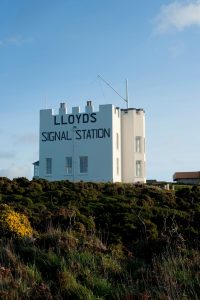
Lloyds Signal Station,
Lizard Point Cornwall
By 1857 the overland electric telegraph had reached Falmouth and in 1872 the firm set up a maritime signal station at Bass Point on the Lizard Peninsula 1.2km east of Lizard Lighthouse. The station was in direct competition with another established next door by GC Fox & Co, also a major company of shipping agents in Falmouth. Predictably this caused confusion for shipping and in 1875 the two companies agreed to merge operations and the Broad station was demolished. By 1877 more than 1000 vessels were using the station each month. In 1882 Lloyd’s stated their intention to set up 27 signalling stations around the UK coast and Fox and Broad’s agreed that Lloyd’s would lease part of the building and take over the signalling and reporting services. The station was operated by Lloyd’s until 1951 and thereafter by the Coastguard Service.[*]
William was head of the firm and presided over the business until his retirement. On his death at his home in Arwenack Street in 1853 he passed on a valuable legacy to the next generations of his family.[*] Not only was he a successful merchant and closely involved in a wide scope of maritime matters but he had also became prominent in the life of Falmouth.
In 1815 the Western Luminary, of January 10th reported that:
‘Captain William Broad, agent and surveyor to Lloyd’s at Falmouth has published a diary of the winds and weather.’[*]
Another report was carried in the Royal Cornwall Gazette of May 31st 1817:
‘The General Shipping Assurance Company of London, have lately presented Mr William Broad, their Agent at Falmouth, with a valuable Piece of Plate, of elegant workmanship, and bearing suitable Inscription, as a testimonial of the high sense they entertain of Mr Broad’s prompt and effectual exertions in rendering assistance to the ship Mary & Dorothy, in distress, near Falmouth, during a storm last winter.’
Furthermore in 1829 William was awarded the Gold Medal of the Royal National Institution.[*] The Larch a 150 ton brig was on her way from Newfoundland to Poole with a cargo of fish, blubber and furs when she foundered off Falmouth in a heavy gale on January 7th 1828. William and a Pilot went out in a six-oared gig and boarded the vessel in an attempt to save her. The Larch was driven onto the rocks but all of the eleven people on board were brought to safety.[*]
This latter exploit was mentioned in his obituary published in 1853 by the West Briton[*] which also stated,
‘Mr Broad, who was the founder of the present firm of William Broad and Sons, was formerly a Commander in the Mercantile Marine, and a member of the old Levant or Turkey Company. He quitted the sea with the highest testimonials in 1808, his vessels Pelican and Phoenix, for many previous years, being invariably selected as the repeating ships in all convoys, entitled to a pendant as such, and his crew always protected from impressments – a great privilege in those days. He was remarkable for extreme kindliness of heart, and for great physical energy, which prompted him on all occasions to acts of daring humanity.”
Three of William’s sons Robert Richards, William Richards and Alfred Richards joined the family firm and remained living and working in Falmouth although Alfred left the partnership in 1844.[*] William’s daughters Emma and Elizabeth also grew up and were married in Falmouth although both ultimately left the town to settle elsewhere.
The Broad family
Robert Richards Broad was born in Penzance and baptised there on 21st June 1797. He subsequently joined his father and his brothers in the family firm. In the 1851 Census he is described as a Justice of the Peace and a Consular Agent and in the 1871 Census as a retired Wine Merchant. He was also Mayor of Falmouth for terms in 1841, 1845 and 1862.[*] During his career he received two orders of foreign knighthood, one from Holland for his services as vice consul for the Netherlands and the other from Saxony for services rendered to the Saxon government.
He married in Falmouth in 1822 to Nancy Tippet Turner (Nanny) who was born in 1796 in Penryn. They lived first on the Bar and then at Lower Brook Street and later at Woodlane Terrace and they had at least eight children.
Robert Richards, known as Robert Richards Broad Senior continued to be actively involved with the business and matters concerning Falmouth throughout his life until his death in 1881 at his home in Woodlane Terrace. His son Robert Richards Broad Junior was the first Chairman of Falmouth Harbour Commissioners when the Commission came into being in 1870.[*] In her book Old Falmouth Susan Gay says of Robert Senior that he ‘was one of the most active public men in Falmouth. Always cheerful and kind-hearted, helpful and energetic, he was the friend of everyone.’
William Richards Broad was baptised in Penzance on the 25th November 1799. By 1809 he was living with the family in Falmouth and later he too became part of the family firm of shipping agents and merchants. He was also actively involved in local life. He was commissioned as a second lieutenant in the Pendennis Artillery Regiment of Local Militia in 181626 and he served as a councillor and on various civic bodies.
In 1825 he was married at Long Ashton, Somerset to Charlotte Rossiter who was born in 1804 in St Thomas, Jamaica. They lived in Falmouth on the Bar and Harbour Terrace and had a large family. William Richards died in 1850. Shortly after his death his widow took her family to London where she lived for the rest of her life.
The youngest son of William and Jane Broad, Alfred Richards Broad was born in Falmouth about 1809 at the time of the establishment of Broad & Co. Like his older brothers he joined the Broad partnership where he worked for some years. He married in 1837, Ellen Southwell Courtis from Plymouth and they were living in Woodlane Terrace where five of their six children were born.
In 1844, however, Alfred withdrew from the partnership and moved to Plymouth where he established himself as a wine merchant. Ellen died in 1851 and sometime later Alfred re-married and another three children were born. Alfred died in Plymouth in 1879. His three surviving sons remained in the wine trade.
William and Jane also had daughters, Emma born in Truro in 1802 and Elizabeth born in Penzance in 1807 who were both married in Falmouth in 1831 and in 1829 respectively.
Emma’s husband, James Hooton was from a Falmouth family. A John Hooton is listed in the Pigot’s directory of 1830 in the High Street Falmouth as a Merchant and agent for Albion Life Insurance[*] and James Hooton is also described as a ‘Merchant’ in documentation. Their first two children were born in Falmouth but their daughter Elizabeth Mattiana (Matiana) was born in 1836 in Mexico. Presumably James was there on business and Emma had accompanied him. By the 1841 Census Emma and James were living in Lambeth, Surrey and were still there in 1851.
Elizabeth married Robert White in 1829 in Falmouth although Robert was born in Aylesbury, Bucks. He was a solicitor at the time of the marriage and subsequently was the Registrar for Falmouth and the Clerk of the County Court in Falmouth.[*] He left that position in 1851. The family seems to have emigrated to the USA by 1853, first to Albany, New York where Robert is described as a Book Agent and subsequently to Detroit where he became a Rail Road Clerk and the entire family appear to have remained in the USA.
Despite the fact that some members of the immediate family left Falmouth the family continued to figure prominently in the town. Various members of the family were also active in many aspects of life in Falmouth. Some were Poor Law Commissioners, sat as magistrates and on various committees and were members of local societies.
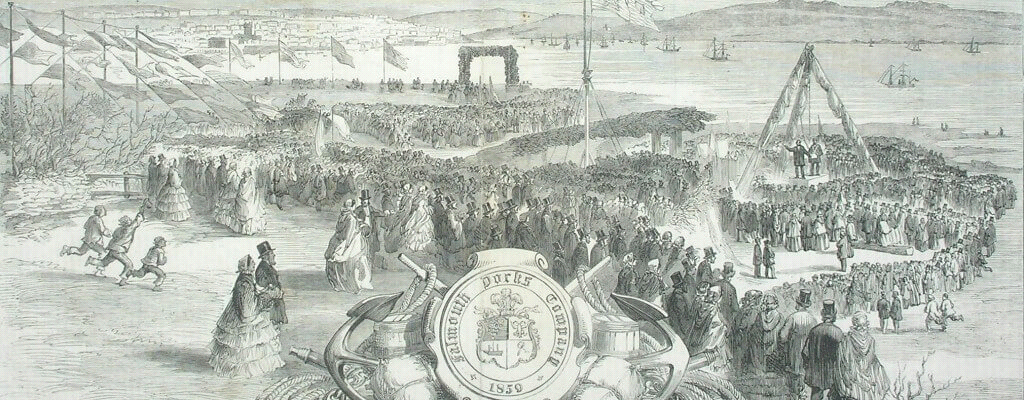
Laying the foundation stone of the new docks at Falmouth 1860, Unknown Artist, Wood Engraving, Falmouth Art Gallery
In 1870 The Falmouth Harbour Commissioners was set up by the Falmouth Harbour Order 1870 to administer Falmouth Bay, Carrick Roads, Cross Roads, and the inner harbour and the Penryn River. Robert Richards Broad (Junior), grandson of William and son of Robert Richards Broad (Senior), was appointed as the first Chairman of the Harbour Commissioners. The family was also closely involved with the establishment and continuing administration of Falmouth Docks,[*] in bringing the railway to Falmouth[*] and were investors in the local mining industry.
The firm of Broad & Sons first established at the beginning of the nineteenth century continued as a major presence in the town trading until well into the twentieth century. Individual members of the family were prominent in both the commercial and social life of Falmouth over the generations and the Broad family could truly be said to have made a great contribution to the town and particularly to the maritime history of Falmouth.
References
Books and Publications
Cox Barry, Ed., Lifeboat Gallantry, Spink, London, 1998
Defoe Daniel, A Tour Thro’ The Whole Island of Great Briton 1724-1727 Vol 1, Ed Pat Rogers, Penguin.
Gardner Victoria E.M., The Business of News, Palgrave Macmillan, 2016.
Gay Susan, Old Falmouth, Headley Bros, London, 1903.
Kirkham Graeme M.A, Cornwall and Scilly Urban Survey- Falmouth HES Report No 2005R003, 2005.
Pawlyn Tony, The Falmouth Packets, Truran, Truro,2003.
Woodfin R.J., The Cornwall Railway to its centenary in 1959, Bradford Barton, Truro, 1972.
Unpublished Notes
Tony Pawlyn -Tony kindly lent me some of his research notes and paper on William Broad and his involvement with the packet ship the Little Catherine
Archive Material
Census Information –UK and USA
Cornwall Record Office (CRO)
National Archives
Newspaper Archives – The London Gazette, The Times, The Royal Cornwall Gazette, The West Briton, The Western Luminary.
Post Office Archive
Websites
Cornwall Council www.cornwall.gov.uk
Cornwall Online Parish Clerks -1832 Voters List for Falmouth www.opc.cornwall.org
Engineering Timelines www.engineering-timelines.com
Falmouth Harbour Commissioners www.falmouthharbour.co.uk
Falmouth Town Council www.falmouthtowncouncil.co.uk
Lloyds www.lloyds.com
